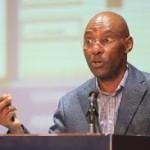
Kampala-In a small tent located in downtown Kampala, you find two middle aged ladies seated in the tent and, on a table there are decoders are displayed alongside a plasma screen showing crystal clear pictures on one of the local channels. People are lining up, some have inquiries and some want to buy the decoders. They know time is running out, they won’t be able to watch their favourite shows on analog; they have to switch to digital broadcasting.
Digital migration was made mandatory at the Regional Radio Communication Conference of 2006 and the Geneva 2006 Agreement of the International Telecommunication Union (ITU) resolved that all countries signatory to the agreement must migrate from analogue to digital broadcasting services by the end of 2015.
In Uganda, in July 2011 the Ministry of Information and Communications Technology (MoICT) formulated a Digital Migration Policy to serve as a guide for a smooth transition from Analogue to Digital broadcasting. The policy is based on principles of access to public information, transparency and accountability, environment protection, competitiveness and productivity, economic and trade infrastructure, access to quality social services, good governance.
The preparatory stage started in July 2009 where digital broadcasting services was delivered ‘on pilot’ basis. And, in July 2011 digital broadcasting was officially launched in the country. Though the switch off date for analogue broadcasting and switch on date of digital broadcasting was December 2012, it wasn’t effected; it was decided that the switch of and switch on date be 17 June 2015, the global deadline. “We want to know what to do since we are late, the funds are not available and technical capacity is not in place,” UCC Executive Director, Godfrey Mutabazi said at the time
Only two members in the East African Community have fully switched to digital broadcasting: Rwanda’s switch-off took place in July 2014, a year ahead of the June 2015 global deadline. Tanzania went all digital in March 2015. Uganda, Kenya and Burundi haven’t switched to digital and it’s not yet clear if the three countries will beat the International Telecommunications Union (ITU) deadline. Uganda and Kenya are set to go fully digital on 17 June 2015 but Burundi’s stand remains uncertain since most structures have not been set up, the ongoing uprisings in the country complicate the process more.
In a country with an estimated 7 million television sets, UCC says about 300,000 use Pay TV stations. This means 95% are watching Free-to-air channels, only 5% are watching Pay per view stations. With the 17 June ITU deadline approaching, is the country ready for the switch-off?
Uganda Communications Commission Acting Director for Broadcasting Mr Otunnu Fred is optimistic that the country will beat the ITU deadline; he says they are in the final stages of the process and that most of the urban areas have been covered. “We are remaining with some few parts of the country but the biggest percentage (of areas) is covered,” he says. The Digital TV signal covers a radius of 60 Km from Kololo, some of the areas listed include; Central, Kawempe, Rubaga, Busega, Wakiso, Bombo, Wobulenzi, Luwero, Mawagga, Mityana, Nakawa, Makindye, Mukono, Lugazi, Lugalambo, Entebbe, Kigungu, Kamengo, Mpigi and Mbizzinya among others.
When asked whether she is ready for the Digital migration, Ms Robinah Namutebi, a resident of Church Zone, Najjanankumbi says she knows nothing about the digital migration. Namutebi claims it’s only for the rich since much emphasis has been put on urban areas. “My relatives are deep in the village and there’s no signal,” she says. But Mr Ottunu says they are in the process of extending the signals to all remote places in the country. “We have so far covered 70%; we hope to extend the digital signal to all areas of the country soon,” he says.
With Uganda Broadcasting Corporation (UBC) mandated as the sole signal distributor, one would ask why the extension of signals nationwide has moved at a slow pace. UBC distributes the content and a service private provider, Signet is responsible for signal distribution. Some digital providers wanted UCC to give them rights to distribute the signals but it decided to give the task to UBC. There are 10 licensed Free to Air providers and a total of 5 digital television providers and if all these were given distribution rights, the country would be fully covered by 17 June, the deadline date.
For a poor woman that sells fried cassava in Kibuye, digital migration sounds like a dream to her. Her daily income is not even enough to cater for the needs of a family of four. Although some providers have cut prices of decoders, Ms. Ruth Ssebugwawo, a resident of Kibuye says the initial prices are too high and so are the monthly charges. ”I earn so little, how can I afford to pay for television yet am struggling to look for what to eat,” asks Ms. Sebugwaawo.
Her views are shared by Mr. David Magara who argues that when buying television sets they pay taxes. He terms the digital migration process as a ‘rushed’ decision. His sentiments are based on the reason that there hasn’t been much sensitisation of the public about digital migration. “Not many of us know about the digital migration, they should have educated us more,’ argued Magara.
For the traders in downtown Kampala, some have hope that the deadline will be extended. They say they shipped in antennas recently and if UCC was to implement the deadline, that would drive them out of business.
But UCC’s Fred Otunnu advises those still thinking of an extension to reconsider and buy the decorders. ‘They have to adapt, technology is evolving and they should embrace it,” he says.
Mr. William Sevirri, an electronics shop owner at Jesco Beauty Centre says that they will still sell the antennas to the unsuspecting masses since they haven’t been sensitized. “Most people don’t know when the deadline is, we will use that chance to sell them the antennas,” he says.He however, acknowledges that in the end they will make losses.
Although there are still challenges in the digital migration process, there’s hope that all Ugandans will finally embrace it.
Seated in his shop is Mr. Pascal Tumusiime’s Lasonic digital television set displays clear crystal images from a local television program. The television lures customers to his shop. Mr. Tumusiime reveals he decided to buy a decoder because he was fed up with watching unclear pictures. “After watching digital television, I don’t think I can switch back to watching analog, these pictures are so clear,’ declares Mr. Tumusiime.
Another ardent TV watcher Abdul Muwanika, a resident of Kawempe, says he too decided to join digital television because of the clear pictures it offers.
Clear images is definitely one of the reasons why many Ugandans have switched to digital migration but Margaret Nakyagaba says she enjoys digital television because of the reliable signal and that many channels are shown at a cheaper price. She says that although the prices are a bit high, technology changes and its part of progress. “Change is not easy and we must hold onto change, we must get used to that,” she comments about the high prices.
As the ITU deadline nears, the country looks set for the migration; most of the crucial issues have been completed, more Free-to-air companies have been approved and more Pay-per-view digital providers are selling more decoders each day that goes by. Unlike Rwanda that completed the migration without upgrading most of its decoders, Uganda will enter the new digital era with high definition DVB-Terrestrial decoders.
But the big question remains: will Uganda go fully digital on 17 June?
Anyway, if the country fails to switch off analog and switch on digital broadcasting, the repercussions will be unbearable since Uganda will not be able to lodge any complaints against analogue broadcasting to the ITU.







